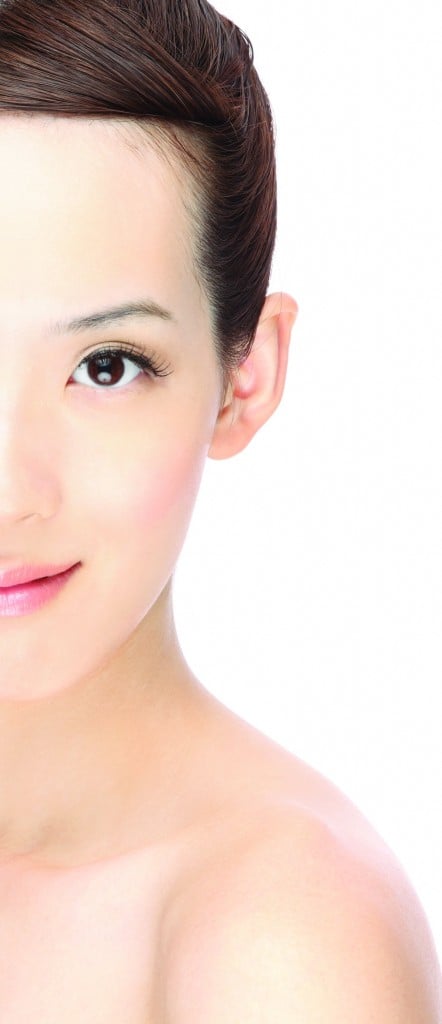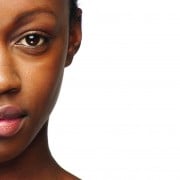We’ve all got a certain type. No, not tall, dark, and handsome; more like dry, sensitive and spotty. When in comes to your skin, understanding your type can make all the difference for looking your best. Here is our guide for ethnic skin types, courtesy of skin guru Leslie Baumann.
If you’ve ever wondered what your skin type is, you’re in the majority. It can be tricky to decipher on your own, but nonetheless critical for effective skin care—which is why Miami dermatologist and best-selling author Leslie Baumann made it her mission to help by designing a comprehensive skin-type test.
“I was inspired by the Myers Brigg personality test, because there are so many skin personalities and one regimen just doesn’t work for all,” says the author of The Skin Type Solution. “Someone with thick, oily, acne-prone skin can benefit from stronger products than someone with a thin, fragile, sensitive complexion who needs gentle, anti-inflammatory ingredients.”
Since many skin doctors believe understanding your type is the basis for good skin care, it’s worth taking Baumann’s quiz on her website (skintypesolutions.com), which follows up with targeted treatment recommendations. Here, we’ve broken down four common skin types by ethnicity, covering each one’s problematic issues and solutions. Consider it your cheat-sheet to maintaining a radiant, youthful look.
CAUCASION, FAIR-TO-MEDIUM
Skin Type: Your skin is generally dry, sensitive, and non-pigmented with a tendency to wrinkle and lose firmness. Those at the medium end of the spectrum may get tanned with sun exposure, but also sunburn easily, whereas the fairer set just burns.
Your Issues: You have less melanin in your skin and less natural sun protection as a result. “Melanin surrounds the nucleus of cells and prevents UV rays from penetrating and damaging skin’s DNA,” explains Dr. Baumann. By the time you reach your late 30s or 40s, you can start to see loss of collagen, which shows up as fine lines but also as more redness. “This is because the capillaries get their structural support from collagen,” she says.
Wrinkles and Redness Rx: Building skin up structurally will help curb both problems. “You’re too sensitive for Retin-A, so use collagen-boosting retinol,” Dr. Baumann says. Try a low-strength formula like RoC Retinol Correxion Deep Wrinkle Night Cream (target.com) or Neutrogena Ageless Intensives Anti-Wrinkle Deep Wrinkle Night Moisturizer (neutrogena.com) and add these supplements to your regimen: Vitamin C (to help build collagen) and anti-inflammatory Omega-3 fatty acids (to minimize flushing). You may also want to invest in a hand-held micro-current device you can use at home, like the new NuFace Trinity (mynuface.com). “Micro-current has been proven to stimulate collagen production,” says Dr. Baumann.
Dryness Rx: Use a super-emollient moisturizer that contains anti-inflammatories like resveratrol and green tea. Try Replenix Power of Three Cream (dermstore.com) or Caudalie Premier Cru La Crème (sephora.com).
Ingredient Alert: Avoid glycolic acids, which, like Retin-A, are too irritating.
Must-Have Product: An anti-inflammatory sunscreen like Eucerin Redness Relief Daily Perfecting Lotion SPF 15 (drugstore.com) with soothing licorice.
OLIVE, LATIN AMERICAN
Skin Type: Your skin is usually oily, pigmented, and has a tendency to spot. But you’re not especially sensitive. Olive skin tones have more melanin, providing some natural sun protection and allowing you to tan easily. “Oily skin naturally produces vitamin E, so you actually make your own anti-aging serum,” says Dr. Baumann. This makes you less inclined to wrinkle than the fair-to-medium type, but anti-aging skincare is just as important, she warns.
Your Issues: “Because you have more melanin, your biggest problems are sun spots and patchy pigmentation that cause uneven tone,” says Dr. Baumann. “Melanin also naturally absorbs rather than reflects light, so you can have less natural radiance.”
Oiliness Rx: The exfoliating action of a salicylic acid cleanser will minimize oil production and blackheads by lifting dead-cell debris out of clogged pores. To balance skin, morning and night, try Neutrogena Oil-Free Pink Grapefruit Acne Wash (drugstores nationwide).
Pigmentation Rx: Encouraging cell turnover with an effective glycolic acid formula will gradually help fade spots (a slow process because pigment is deep within the skin, not just on the surface). A glycolic treatment like Vivité Night Renewal Facial Cream (skinstore.com) at night will also increase radiance.
Ingredient Alert: Steer clear of heavy moisturizers and essential oils. You just don’t need them. In fact, try waiting 45 minutes after you wash your face before putting anything on to avoid that overly shiny look come midday. “Your natural oil production will kick in and should give you a nice glow,” says Baumann.
Must-have product: Preventing spots in the first place is key, so you need sunscreen. Since chemical blocks can contribute to that slick feeling, go for a physical block containing titanium dioxide or zinc oxide. “I recommend a micronized mineral formula that’s tinted rather than white, since many mineral blocks are harder to blend into darker skin,” says Dr. Baumann. Try MD Solar Sciences SPF 30+ Mineral Sunscreen Tinted Gel (mdsolarsciences.com) or dust on a powder sunblock (try Colorescience Pro Sunforgettable SPF 50; colorescience.com).
ASIAN


Your Issues: A less effective moisture barrier makes it harder to prevent moisture from evaporating and irritants from getting in. “Think of skin cells in the epidermis as bricks and fatty acids surrounding the cells as mortar holding them together,” describes Dr. Baumann. “Asian skin has fewer natural fatty acids, so it gets easily inflamed, which triggers the melanin-producing cells to create pigment.”
Inflammation Rx: The surfactants (organic compounds that help absorbtion) in many foaming face washes are too harsh and stripping for you, so prevent irritation problems with a skin-calming emollient cleanser. Try a milky formula that doesn’t bubble like Patyka Absolis Cleansing Milk (dermstore.com) or Kiss My Face Creamy Face Cleanser (kissmyface.com). Another option: Soothe and hydrate with a cleansing oil, like Shu Uemura Cleansing Oil (shuuemura-usa.com).
Dryness Rx: Increase moisture by smoothing on a gentle treatment oil like Josie Maran Organic Argan Oil (sephora.com). Use heavy-duty moisturizers like Fresh Crème Ancienne (sephora.com) or Atopalm Revitalizing Complex (skinstore.com), a popular Korean import, on its own or layer it over the oil for extra hydration.
Ingredient alert: UV light, hormones and inflammation all contribute to melasma, so steer clear of the sun and avoid anything drying or irritating, such glycolics or retinoids. Consult a dermatologist about how birth control may affect your hormones. Patchy pigment is difficult to treat, so prevention is the best approach.
Must-have product: In addition to being diligent with sunscreen, the SunPill (drugstore.com) is beneficial, whether you have melasma or want to prevent it. The supplement contains a pigment-fighting fern extract. “In a clinical study, it improved melasma by blocking inflammation and helping to turn off pigment-producing melanocytes,” says Dr. Baumann.
DARK, AFRICAN AMERICAN


Your Issues: “Acne can be a problem, due to oil production and clogged pores,” says Dr. Baumann. “But I also see clients who use very emollient hair products to combat their hair’s dryer texture, and the products get on their pillow and migrate to their face, contributing to breakouts.” Because you naturally have more pigment in your skin, dark spots can result from post-inflammatory hyper-pigmentation (PIH) even when the pimples go away.
Acne Rx: Spot treating isn’t the best choice for you, because once you have the zit, you’ll likely end up with a spot. Instead, practice prevention with an anti-acne regimen. “There are lots of over-the-counter options but talk to a derm about a topical prescription option like Differin or Tazorac,” says Dr. Baumann. Skincare starts with the right cleanser—your skin will benefit from a bubbly, deep-cleansing wash. Choose one that has salicylic acid and anti-bacterial agents like colloidal silver and probiotics. Sonya Dakar NutraSphere Silver Clarifying Wash (sonyadakarskinclinic.com) boasts all three. Use a retinol serum at night to increase exfoliation and promote collagen, too. Try Specific Beauty Night Treatment Complex (specificbeauty.com), a serum formulation that is great because it’s lighter and sinks right in.
PIH Rx: Your best bet is to use a vitamin C serum each morning to fade existing spots and prevent future ones. “Vitamin C is a tyrosinase inhibitor, it blocks the enzyme that triggers skin darkening,” says Dr. Baumann. Try Laroche-Posay Active C Facial Moisturizer (cvs.com) or SkinCeuticals C E Ferulic (skinceuticals.com).
Ingredient alert: Beware of heavy creams (and hair products!) with shea, argan oil, coconut oil, and other emollients that can clog pores.
Must-have product: The Tria Skin Perfecting Blue Light (triabeauty.com). Says Baumann, “It helps prevent acne by killing bacteria.”










